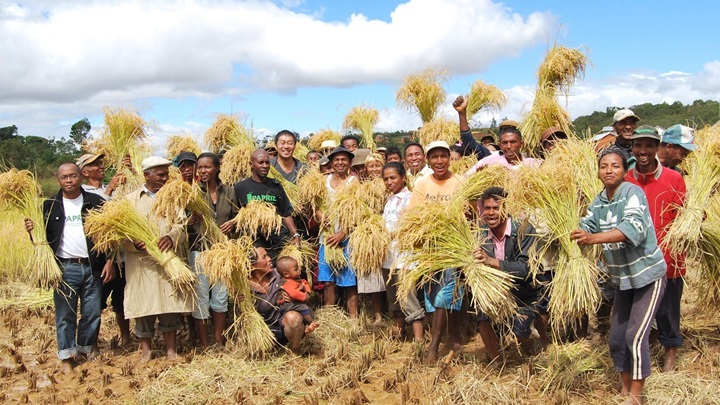TICAD9 Series (1): Research on the Role of Agriculture in Africa’s Development
2025.02.26

(Photo:JICA)
In anticipation of the Ninth Tokyo International Conference on African Development (TICAD9) in August 2025, the JICA Ogata Research Institute will present a series of articles covering its research findings and studies on Africa. The first in the series will focus on agriculture.
Agriculture is a vital industry in Africa, employing nearly half of the labor force. With Africa’s working-age population continuing to grow, the sector is expected to develop further, ensuring sustainable economic growth by providing opportunities for women and youth, for instance. In January 2025, the African Union held an extraordinary summit in Kampala, Uganda , reaffirming its commitment to the Comprehensive Africa Agriculture Development Programme (CAADP) . Over the next decade (2026–2035), Africa will work toward building resilient and sustainable agri-food systems.
The following research analyzes the factors delaying CAADP’s progress, emphasizing the need to transition from planning to implementation:
JICA Ogata Research Institute also conducts various other studies related to agricultural development and food security in Africa. Please take a moment to explore our research findings and project accomplishments in this area.
The international initiative “The Coalition for African Rice Development (CARD)”, launched at TICAD IV, is designed to help find medium- and long-term solutions to the problem of food availability in Africa and to reduce poverty by doubling the rice production. This study provides an empirical analysis of how the CARD initiative serves to increase rice productivity and reduce poverty.
Click the links below for more details.
This open-access book seeks an effective strategy that can facilitate the realization of a green revolution in rice in sub-Saharan Africa. It demonstrates the substantial and sustained impact of rice cultivation training on productivity and the existence of spillover effects from trainees to other farmers. In addition to this it presents new assessments, including the importance of mechanization in the intensification of rice farming, and the modest returns of large-scale irrigation schemes.
Agricultural productivity in Africa is about one third of that of comparable Asian small holder farmers. Many factors affect agricultural productivity, and these differ by product and by country. In an attempt to find lasting solutions to help remedy low productivity and kickstart the transformation of the agricultural sector in Africa, this joint collaborative research between JICA and the African Center for Economic Transformation (ACET) aims at providing practical policy recommendations for transforming African economies.
The Smallholder Horticulture Empowerment and Promotion (SHEP) approach encourages farmers to change their mindset from “grow and sell" (cultivating crops without understanding how the agriculture products are sold in the market), to “grow to sell" (providing products based on the market demand). This project evaluates the impact of the SHEP approach on smallholder livelihoods using empirical and sociological methodologies.
Using a quasi-experimental sampling of 610 farmers, this study in Oromia, Ethiopia, shows that SHEP improves income and food security for smallholder horticulture farmers. The study also shows that the project’s gender equality training has led to more joint couple decision-making by beneficiary households, thereby contributing to better food security.
Since 2008, the JICA Ogata Research Institute has partnered with Columbia University’s Initiative for Policy Dialogue (IPD), led by Professor Joseph Stiglitz, to expand global research networks. Part III of this book discusses Africa’s economic transformation, including agricultural development.
This study discusses evaluation methods related to climate change adaptation measures in consideration of uncertainty. The methods are applied to Kenya’s Mwea Irrigation Development Project for validation.
This column series by Senior Research Fellow Amameishi Shinjiro discusses Africa’s sustainable development through food security and agricultural development from three perspectives: (1) future food security; (2) youth employment (forthcoming); and (3) gender equality and women’s empowerment in rural areas (forthcoming).

事業事前評価表(地球規模課題対応国際科学技術協力(SATREPS)).国際協力機構 地球環境部 . 防災第一チーム. 1.案件名.国 名: フィリピン共和国.

事業事前評価表(地球規模課題対応国際科学技術協力(SATREPS)).国際協力機構 地球環境部 . 防災第一チーム. 1.案件名.国 名: フィリピン共和国.

事業事前評価表(地球規模課題対応国際科学技術協力(SATREPS)).国際協力機構 地球環境部 . 防災第一チーム. 1.案件名.国 名: フィリピン共和国.

事業事前評価表(地球規模課題対応国際科学技術協力(SATREPS)).国際協力機構 地球環境部 . 防災第一チーム. 1.案件名.国 名: フィリピン共和国.

事業事前評価表(地球規模課題対応国際科学技術協力(SATREPS)).国際協力機構 地球環境部 . 防災第一チーム. 1.案件名.国 名: フィリピン共和国.
scroll